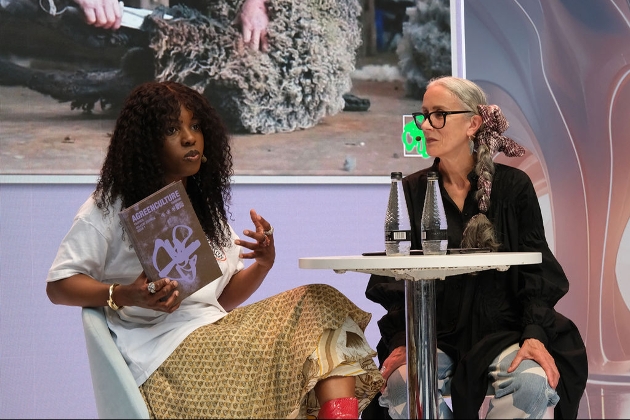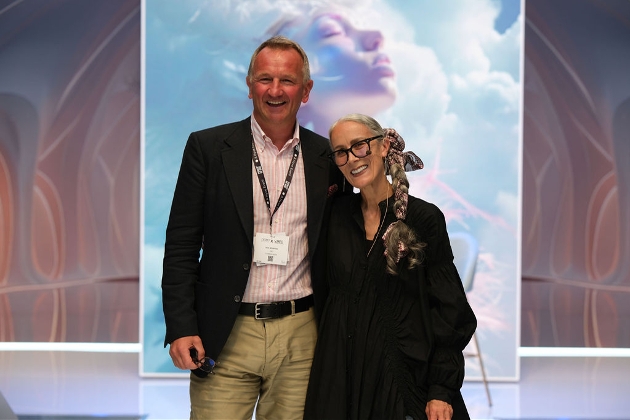“I DON’T THINK WE SHOULD MAKE LESS, I THINK WE SHOULD MAKE BETTER” SAYS NICK BEIGHTON AT SOURCE FASHION
Thousands of visitors from brands and retailers including Clarks, French Connection, Lyle & Scott, Paul Smith, PepsiCo, Reiss, Jaded, River Island, Sainsburys, Very Group, AX Paris, Debenhams, Hunter, Boden, Amazon and many more converged on Olympia London for day two of Europe’s largest responsible sourcing show, Source Fashion.
Setting the Agenda
Focused on Trends, Legislation and Big Brand Ideology, a hard-hitting seminar programme tackled topics including the impact of AI, updates on key legislation and policies, collaboration and fashion integrity, and big-brand approaches to sustainability with Next Retail and PepsiCo.
Suzanne Ellingham, Event Director of Source Fashion says, “The recurring theme throughout an incredible day of talks is that collaboration, the sharing of best practice, education, and storytelling are key to achieving a better fashion industry. There is a need and desire to do much better business and with new legislation and the opportunity to hold open conversations I feel pretty positive that these changes are more and more likely. I’m excited by the interest our visitors have in listening and learning, we are creating an ecosystem at the show where the industry can meet and discuss the big issues as well as the success stories in a safe space.”
Visitors flocked to the stage to hear fashion activist Caryn Franklin MBE in conversation with former CEO of ASOS Nick Beighton giving us an insight into a space few have access to. On his leadership style Beighton said, “Leadership isn’t a right, it’s a privilege, you have to do something with it.” When first appointed as CEO of ASOS he said he wanted the brand to be mission-led and driven by values; to think differently about how to employ skills, incentivise staff and run a brand with integrity producing great fashion. He said, “I thought, if we do it this way, we’ll influence an industry, build a better brand, and do something worthwhile.”
Asked how to educate shareholders out of profit greed, he responded, “I’m an unashamed capitalist but capitalism creates problems and issues. Conscious capitalism overall gets better results. I reconcile it with creating a purpose for a brand. Purpose should drive profit, not profit driving purpose. We can use capitalism to change the agenda and future-proof business. It can enrich and change the ecosystem.”
Pressed on the subject of degrowth and the idea that we need to produce less, Beighton responded saying, “I don’t think we should make less, I think we should make better. Make garments in a transparent way where you know where the materials are grown, you know the conditions of the factory. Imagine the farm and factory had glass walls – if you could see everything going on in there would you still want that garment?”
He added, “There is no competitive advantage to abusing the planet. We need to collaborate for better solutions on everything from packaging to plastics.” Franklin invited Beighton to comment on proximity sourcing, he said, “The P&L works, the agility works, there’s nothing faster than UK sourcing. It’s very important to the future of fashion to encourage more craft in the UK.“
Jack Stratten from Insider Trends kicked off the morning sessions with a fascinating trend presentation on the importance of storytelling, history and heritage in response to the growth in AI fuelled fast-fashion. Polarised spending sees consumers spending on both cheap brands like Shein and Temu as well as smaller, more ethical brands, but too much choice is confusing them. Stratten says, “The more brands there are, the less loyalty there is. The market is saturated with brands trying to reach an audience. Successful brands invest in stories. Customers don’t just want cheaper. Cheap doesn’t tell a story. There’s a need for something more distinct in a sea of sameness that consumers are struggling to navigate.”
Mike Coates, Assistant Director of Fashion Retail Enforcement at the UK Competition and Markets Authority (CMA) delivered a comprehensive presentation on tackling greenwashing, the Green Claims Code guidance, and their fashion investigations. He said, “Businesses are going to have to come together and collaborate to achieve the step changes they need to make. It is the holy grail to be able to show the consumer an entire product journey.”
The big brand approach continued in the afternoon with a fireside chat with Jo Mourant, Head of Sustainability and Product at Next Retail. Mourant shared hers and the retailer’s responsible sourcing journey and discussed the challenges and opportunities facing the business and the industry as a whole, from legislation and the need for accurate data to sharing best practice and collaborating.
Hayley Shore, Design Director at PepsiCo followed, also highlighting the need for collaboration, with learning and shared knowledge around traceability and transparency transferable between FMCG and fashion brands. Shore proudly displayed pieces from a new Pepsi fashion collection which has mostly been produced in the UK or Europe, with offcuts and waste being re-used in the next collection. She says on the creation process, “It’s important to ask ‘who’s making it, what’s the footprint, what’s the products lifecycle, is it fit for purpose, why are we making it, and are we giving ourselves enough lead times to create it in a better way. It’s also about educating our partners to invest more in the process of making things better.”
Shore also shared her experience of the show, “Source Fashion has provided so much information to us already around the sustainable fashion space. From the first event we attended in February, to now, we see that the whole space is constantly growing, and we are really excited to grow with that.”
Caryn Franklin returned to the stage for a conversation with Tina Wetshi, Creative Director of Colechi. Wetshi is dedicated to displaying the intersection of culture and politics through art and fashion. In this session, Caryn and Tina discussed the roles and relationships that fashion symbolises by forming new connections across the fashion supply chain including re-establishing the link between agriculture and fashion. Wetshi says, “We understand the link with food, that what we eat affects us, but it’s not an open topic in fashion. Fashion needs to operate within nature, and we need to re-humanise it.”
The final day of Source Fashion opens tomorrow at 9.30am. The Source Fashion stage focuses on Learning, Education and Certification. Don’t miss informative talks on the Developing Countries Trading Scheme, B Corp certification, how to source in new regions, understanding the Global Organic Textile Standard and building credibility through certification, and a panel session on derisking supply chains by working with new regions.
Visit Source Fashion for more information.

